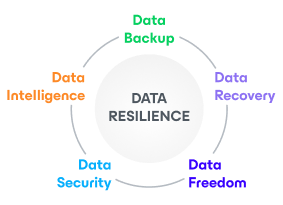In our first blog post in this series, we explored the basics of application mobility in Kubernetes. Now let’s take a look at the value application mobility provides for the following four use cases:
- Cross-cloud portability
- Multi-cloud load balancing
- Cluster upgrade testing
- Data management
While there are other use cases for application mobility in Kubernetes, these are the four most common, since they address some of the most pressing challenges of working in a Kubernetes environment.
1. Cross-Cloud Portability
Vendor lock-in is never a good thing. Organizations want the flexibility to choose best-in-class solutions from multiple providers. When customers have commodity object storage or virtual machines running on Linux, moving workloads from on-prem to cloud, or between clouds, is relatively easy.
However, in the world of Kubernetes, things can get complicated. Management and observability features can vary from provider to provider, and some cloud vendors may offer additional services that benefit Kubernetes users. Modern applications are a complex set of services, configurations and resources, and it’s important to choose a platform that has the right combination of services to meet your needs.
2. Multi-Cloud Load Balancing
Many factors contribute to the decision to run workloads across different clouds: cost, location and a variety of other business initiatives. Nevertheless, ensuring consistency in multi-cloud environments is key. Just as continuous integration/continuous delivery (CI/CD) pipelines support the deployment of new features and updates to software, tools for ensuring consistent updates and delivery of other components are essential.
3. Cluster Upgrade Testing
When releasing new features for Kubernetes applications, testing is critical. Developers may test new versions in a sandbox environment initially, but after that, it’s always a best practice to test them in an environment that mimics the production environment. Application mobility enables realistic, effective testing, because developers can leverage production data in production-like testing environments, without putting any production services or data at risk.
4. Data Management
Depending on the type of data contained in your applications, various data management requirements will apply. Sensitive information might need to be encrypted or protected using other measures, such as storing it in a specific geographic region or special environment. Performance concerns may also be at play. Application mobility helps organizations comply with security and performance requirements by making it easier to move applications and data as needed.
Application Mobility for Any Use Case
Kasten K10 by Veeam enables application mobility for these use cases and more with automatic import and restore, environment isolation and reliable, automated workflows:
- Automatically import and restore changes to applications to provide DevOps a simplified path to update apps in production across infrastructures and clouds.
- Enable migration between non-federated clusters, boosting operational control, while addressing internal requirements and data management regulations.
- Avoid custom scripting typically required for migrating applications, and leverage on-demand workflows to execute cross-platform migrations.
Read more about Kasten K10 for application mobility in the Gorilla Guide to Kubernetes Native Application Mobility (Express Edition).

